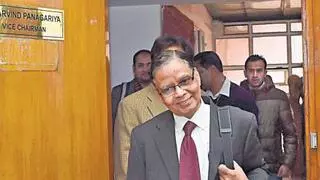
Prime Minister Narendra Modi with Chief Ministers and Governors of various states at the retreat at Race Course Road, following the meeting on Planning Commission revamp, in New Delhi. File photo | Photo Credit: PTI
The 65-year-old Planning Commission was today replaced by a new body, NITI Aayog or National Institution for Transforming India, which will serve as a policy think-tank for the central as well as state governments and have Prime Minister Narendra Modi as its Chairperson.
The NITI Aayog will have a governing council comprising all state Chief Ministers and Lieutenant Governors and will work towards fostering a ‘co-operative federalism’ for providing a “national agenda” to the Centre and States.
The body will have a CEO and a Vice Chairperson, to be appointed by the Prime Minister, in addition to some full-time members and two part-time members, while four union ministers would serve as ex-officio members.
The Planning Commission, known as a socialist era institution, instead had a Deputy Chairperson.
Besides, there would be specific regional councils, while experts and specialists from various fields would be there as “special invitees nominated by the Prime Minister”.
NITI Aayog will serve as a ‘Think Tank’ of the Government as “a directional and policy dynamo” and would provide the governments at the Centre and in states with strategic and technical advice on key policy matters including economic issues of national and international importance, an official statement said.
NITI Aayog follows Prime Minister Narendra Modi’s announcement in his Independence Day speech in August 2014 that there is a need for replacing the Planning Commission by a new body keeping in view the changed economic scenario.
The government has set up the new body through a Cabinet Resolution, wherein it has invoked words of leaders like Mahatma Gandhi, B.R Ambedkar, Swami Vivekanand and Deen Dayal Upadhyaya.
While the two part-time members would be from leading universities and research organisations, the number of full time members has not been specified as yet.
As per the Resolution, the NITI Aayog will provide a ‘national agenda’ for the Prime Minister and Chief Ministers to foster cooperative federalism while recognising that “strong states make a strong nation”.
It will also interact with other national and international Think Tanks, as also with educational and policy research institutions.
More Like This
Published on January 1, 2015




Comments
Comments have to be in English, and in full sentences. They cannot be abusive or personal. Please abide by our community guidelines for posting your comments.
We have migrated to a new commenting platform. If you are already a registered user of TheHindu Businessline and logged in, you may continue to engage with our articles. If you do not have an account please register and login to post comments. Users can access their older comments by logging into their accounts on Vuukle.